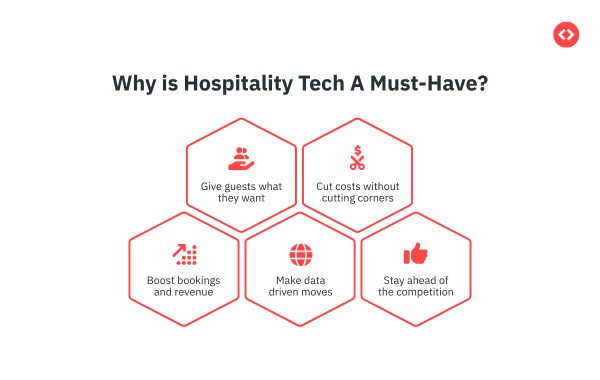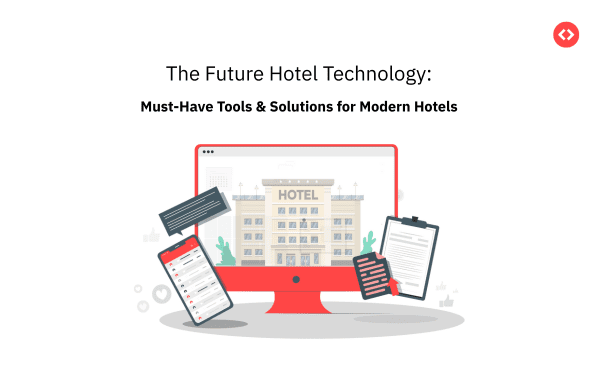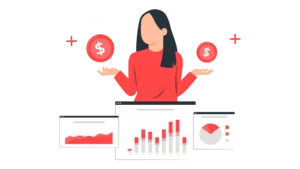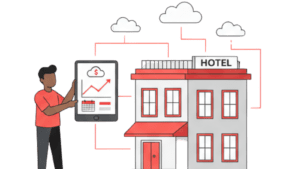Table of Contents
Updated : Jul 22, 2025
In today’s fast-paced hospitality industry, having a profitable tech stack is essential for profitability. Imagine seamlessly managing reservations, enhancing guest experiences, and optimizing operations with cutting-edge tools like property management systems, channel managers, and revenue management software.
According to a study by Skift, hotels that effectively integrate a comprehensive tech stack see an average increase in revenue per available room (RevPAR) by 10-20%. By leveraging a robust hotel tech stack, you can streamline operations and make data-driven decisions that positively impact your bottom line.
Understanding Hotel Tech Stack

1. What is it?
Let’s start with the basics: Think of a hotel tech stack as the backbone of your hotel’s operations. It’s a collection of software and tools that work together to streamline your tasks, enhance guest experiences, and ultimately boost profitability. From booking engines to property management systems (PMS), and customer relationship management (CRM) tools to revenue management systems (RMS), the Hotel Tech Stack encompasses everything you need to run a tight ship.
Many times, hoteliers face challenges, especially when it comes to revenue management, such as:
- Uncertainty about pricing decisions – Setting rates based on intuition, risking underpricing or lost revenue opportunities.
- Missing peak demand opportunities – Lacking the ability to quickly adapt pricing for high-demand events and seasons.
- Balancing guest loyalty & revenue – Long-time guests expect consistent pricing, making it hard to raise rates.
- No clear competitive benchmarking – Struggling to track nearby hotel rates and adjust accordingly.
- Lack of forecasting insights – Needing better tools to predict demand and plan room rates proactively.
PriceLabs helps independent hotels optimize pricing with data-driven automation, ensuring you’re never underpriced or leaving money on the table. With easy setup, seamless PMS integration, and full pricing control, you get more revenue with less effort.
PriceLabs makes pricing effortless:
- See what competitors are charging so you can price smarter.
- Automate rate updates based on demand, seasonality, and occupancy.
- Easily adjust prices in bulk across all units in seconds.
2. Why Hotel Tech Stack?
A well-integrated hotel tech stack allows hotel owners and managers to automate routine tasks, gain insights through data analytics, and personalize guest experiences. It’s your toolkit for efficiency and profitability, ensuring you can focus more on what really matters: delighting your guests.
3. How is the Hotel Tech Stack interconnected?
Imagine your booking engine seamlessly communicating with your PMS, automatically updating room availability without manual effort. Your CRM captures every guest interaction, feeding data into your RMS to optimize revenue strategies based on real-time demand. Each component of the hotel tech stack communicates with the others, creating a harmonious ecosystem that enhances operational efficiency and guest satisfaction.
Mistakes to Avoid While Building Your Hotel Tech Stack
Building the perfect hotel tech stack can be a game-changer for your business, but there are common pitfalls you should avoid:
1. Ignoring Integration Capabilities
One of the biggest mistakes you can make is choosing tools that don’t integrate well with each other. Imagine your Property Management System (PMS) not syncing seamlessly with your booking engine or channel manager. This leads to data silos, inefficient workflows, and ultimately, lost revenue opportunities. Always prioritize tools that offer robust integration capabilities to ensure a cohesive and efficient operation.
2. Overlooking Scalability
As your hotel grows, your tech stack should be able to grow with it. Starting with a basic system might seem cost-effective initially, but if it can’t scale up as your business expands, you’ll find yourself back at square one. Invest in solutions that offer scalability and can accommodate an increase in guests, staff, and services without a hitch.
3. Choosing Cost Over Quality
It’s tempting to opt for more inexpensive solutions when building your hotel tech stack, but this can be a short-sighted approach. Lower upfront costs often come with hidden expenses in terms of maintenance, support, and potential downtimes. Prioritize quality and reliability over cost to ensure smooth operations and guest satisfaction.
Transform your hospitality approach today
Discover actionable strategies tailored for small hotel owners and managers creating unforgettable stays for your guests & expanding revenues for your hotel!
Start your 30-day FREE trial now!4. Neglecting Guest Experience Enhancements
In today’s competitive market, guest experience is king. Technologies like mobile check-in/out systems or personalized communication platforms are vital for enhancing guest satisfaction and loyalty. Ensure your tech stack includes tools that elevate the guest experience.
5. Skipping Staff Training
Even the most advanced hotel tech stack can fall flat without proper staff training. Your team needs to understand how to use these tools efficiently to maximize their potential. Allocate time and resources for comprehensive training sessions to empower your staff and improve overall productivity.
Hotel Tech Stack Essentials
When building a hotel tech stack that drives profitability, it’s crucial to focus on tools that streamline operations and enhance the guest experience, such as:
Property Management System (PMS)
A robust PMS is the backbone of your hotel’s operations, handling everything from reservations to billing. It centralizes data, ensuring smooth communication across departments. With an efficient PMS, you can offer seamless check-in/check-out experiences and manage room inventory effortlessly.
Recommended Software: Opera PMS, Cloudbeds
Channel Manager
Managing online distribution channels is vital for maximizing occupancy and revenue. A channel manager connects your hotel to multiple OTAs (Online Travel Agencies) and updates availability in real-time, preventing overbookings and ensuring rate parity across platforms.
Recommended Software: STAAH
Customer Relationship Management (CRM)
In the hospitality industry, understanding your guests’ preferences can significantly enhance their experience. A CRM system helps you collect and analyze guest data, enabling personalized communication and targeted marketing campaigns that drive loyalty and repeat bookings.
Recommended Software: Revinate, Salesforce
Revenue Management System (RMS)
To maximize profitability, an RMS uses data analytics to forecast demand and optimize pricing strategies. It helps you set competitive rates that adjust dynamically based on market conditions, ensuring you capture optimal revenue.
Recommended Software: PriceLabs
Here’s what happens when hotels switch to PriceLabs:
- Hotels using dynamic pricing see up to 18% higher RevPAR in their first year.
- Smart automation adjusts prices daily based on demand and competition.
- Stay ahead of the market with real-time competitor insights.
Guest Engagement Platforms
Enhancing guest engagement is key to standing out in a competitive market. These platforms enable you to communicate with guests through their preferred channels, offer concierge services, and gather feedback for ongoing improvement.
Recommended Software: HiJiffy, Zingle
By integrating these essential tools into your hotel’s tech stack, you’ll not only streamline operations but also create memorable experiences that enhance guest satisfaction and drive revenue.
How to Build a Modern Hotel Tech Stack

Building a modern hotel tech stack can seem daunting, but with a strategic approach, it becomes manageable and rewarding. Here’s a step-by-step guide to help you navigate this process:
1. Identify Your Needs
Begin by assessing your hotel’s specific needs. Are you looking to enhance the guest experience, streamline operations, or improve revenue management? Understanding these needs will guide your tech stack choices.
2. Research Available Solutions
Dive into the myriad of solutions available in the market. Look for technologies that align with your goals, such as PMS, CRM tools, and channel managers. Remember, your hotel tech stack should be tailored to meet your specific operational and guest service requirements.
3. Prioritize Integration
Ensure that new tools can seamlessly integrate with existing systems. A cohesive tech stack enhances efficiency and reduces the risk of data silos. Interoperability is key to maximizing the benefits of your hotel tech stack.
4. Consider Scalability
Choose solutions that can grow with your business. Whether you’re expanding your property or increasing occupancy rates, your hotel tech stack should support scalability without compromising performance.
5. Evaluate User-Friendliness
User-friendly interfaces are crucial for staff adoption and training efficiency. A complex system can hinder productivity, so opt for intuitive tools that simplify processes within your hotel tech stack.
6. Focus on Data Security
Protecting guest data is paramount. Select technologies that prioritize security measures and comply with industry standards to safeguard sensitive information within your hotel tech stack.
7. Test and Implement
Before full deployment, conduct pilot testing to identify any issues or adjustments needed. Gather feedback from staff and make necessary tweaks to ensure a smooth implementation process for your new hotel tech stack.
8. Monitor and Optimize
Regularly review the performance of your tech stack components. Stay updated with software upgrades and emerging technologies to keep your hotel tech stack modern and effective.
Way Forward
The way forward for hotel owners and managers is to continuously assess and adapt their tech stack to meet evolving guest expectations and operational demands. By integrating tools like property management systems, guest experience platforms, and revenue management software, you can streamline operations and enhance guest satisfaction, ultimately driving profitability. Remember, the Hotel Tech Stack isn’t a one-size-fits-all solution; it should be tailored to your unique needs and goals. So, stay curious, keep exploring new technologies, and don’t hesitate to innovate—your guests and your bottom line will thank you!
Frequently Asked Questions (FAQs)
1. How Do I Choose the Right Tools for My Hotel Tech Stack?
Selecting the right components for your hotel tech stack involves understanding your property’s specific needs and challenges. Additionally, you may require a more comprehensive CRM system to effectively manage guest relationships. Start by identifying pain points and prioritizing features that address them. Remember to ensure compatibility between different systems to create a cohesive and effective tech ecosystem.
2. Can a Hotel Tech Stack Really Improve Revenues?
Absolutely! A well-curated hotel tech stack can significantly enhance your bottom line. By automating routine tasks, you free up time for your staff to focus on delivering personalized guest experiences. Enhanced data analytics from integrated systems can inform smarter pricing strategies, optimize resource allocation, and improve marketing efforts. In essence, a strategic hotel tech stack not only cuts costs but also drives revenue growth.







